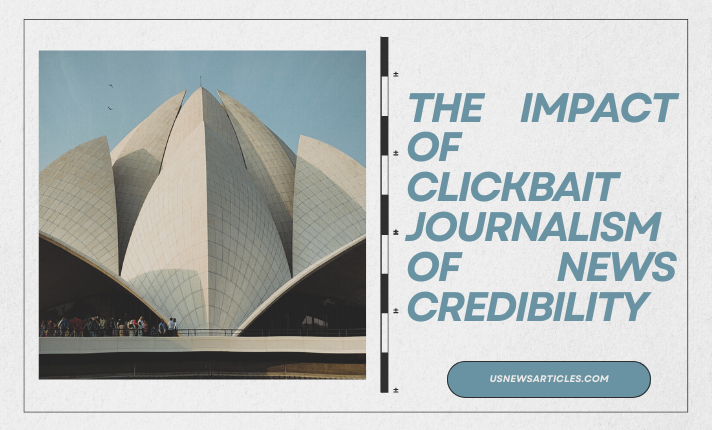The impact of clickbait journalism on news credibility
Introduction: In today’s fast-paced digital world, the influence of social media on shaping public opinion cannot be ignored. From Facebook to Twitter, Instagram to YouTube, these platforms have become powerful tools for disseminating information and driving conversations. But with its vast reach and ability to spread both truth and misinformation at lightning speed, how does social media impact our understanding of current events? In this blog post, we will delve into the role of social media in shaping public opinion and explore its implications for journalism and news credibility.
Introduction to Ethical Considerations in Modern Journalism
The modern journalist is faced with a myriad of ethical considerations that were unheard of just a few decades ago. With the advent of social media, the 24-hour news cycle, and the ever-increasing pressure to be first, it’s more important than ever for journalists to be aware of the ethical implications of their work.
From clickbait headlines to the use of anonymous sources, many potential pitfalls can damage a journalist’s credibility and reputation. In this section, we’ll take a look at some of the most common ethical considerations faced by journalists today.
Clickbait headlines are designed to get readers to click on a link without giving them any real information about what they’re clicking on. This practice is widespread on social media sites like Facebook and Twitter, where users are bombarded with headlines that promise more than they deliver.
While clickbait can be an effective way to get people to read your articles, it also erodes trust in the media. When readers feel like they’ve been tricked into clicking on an article, they’re less likely to believe what they read.
The use of anonymous sources is another common ethical dilemma faced by journalists. In some cases, anonymity is necessary to protect a source from retaliation. But in other cases, it’s used simply to add intrigue or drama to a story.
When used properly,
anonymous sources can be a valuable tool for reporters. But when abused, they can damage a journalist’s credibility Challenges of Unbiased Reporting in Polarized Political Climates
The challenge of unbiased reporting is that it is difficult to find a middle ground in a polarized political climate. In such an environment, people are quick to judge and label anything that does not fit their worldview as “fake news.” This makes it hard for journalists to report on both sides of an issue without being accused of bias.
Another challenge of unbiased reporting is that social media can be used to manipulate public opinion. Clickbait headlines and sensationalized stories are designed to generate clicks and likes, but they often distort the truth. This can make it difficult for people to know what to believe, and it can erode trust in the media.
Journalistic ethics also come into play when reporters rely on anonymous sources. While anonymity can protect sources from retaliation, it also allows them to make unsubstantiated claims without consequence. This can lead to false or misleading information being published, which damages the credibility of journalism as a whole.
Undercover reporting can be ethically fraught. While it can provide vital information about wrongdoing, it also raises questions about deception and invasion of privacy. Balancing the need for transparency with respect for individual rights is not always easy, but it is essential to maintain the public’s trust.
Impact of Clickbait Journalism on News Credibility
The internet has drastically changed the way news is consumed. In the past, people would get their news from television or newspapers. However, people now get their news from social media platforms such as Facebook and Twitter. This shift has led to a decrease in the credibility of news sources.
Clickbait journalism is a type of journalism that uses sensational headlines and content to get clicks. This type of journalism is often used on social media platforms and can be very harmful to the credibility of news sources.
When clickbait articles are shared on social media, it can lead people to believe that the article is credible simply because it was shared by someone they know. However, just because an article has been shared by someone you know, does not mean that it is credible. Many times these articles are full of false information or exaggerated claims.
Clickbait journalism can also lead to people only consuming information that supports their own beliefs. When people only see headlines that support their beliefs, they become echo chambers where their beliefs are reinforced but they are not exposed to different points of view. This can lead to a decrease in critical thinking and an increase in confirmation bias.
The impact of clickbait journalism on news credibility is very negative. Clickbait articles often contain false or exaggerated information and they can lead people to only consume information that supports their own beliefs.
The Role of Social Media in Shaping Public Opinion
Social media has become one of the most powerful tools in shaping public opinion. With platforms like Facebook and Twitter, people can share their opinions with a large audience quickly and easily. This has led to a rise in the number of people using social media to voice their opinions on current affairs and news stories. However, this also means that there is a greater risk of misinformation being spread. To combat this, news organizations need to be more transparent about their sources and journalistic practices.
Clickbait journalism is a major problem for news credibility. With headlines that are designed to generate clicks rather than inform, many news stories are reduced to little more than clickbait. This harms the reputation of journalism as a whole and makes it difficult for people to know what to trust.
The use of anonymous sources is another ethical dilemma facing journalists today. On one hand, it can be vital in getting information that would otherwise be inaccessible. On the other hand, it can be abused to spread false or unverified information. News organizations need to strike a balance between protecting their sources and ensuring that the information they publish is accurate.
Undercover reporting can often lead to ethical dilemmas. While it can provide vital insights into stories that would otherwise go unreported, it can also put reporters at risk of breaking the law or compromising their sources. News organizations need to carefully consider the risks and benefits of undercover reporting before undertaking any such investigations.
The issue of transparency
Journalistic Ethics and the Use of Anonymous Sources
In recent years, there has been an increase in the number of journalists who rely on anonymous sources. This is due, in part, to the fact that many news organizations have become more accepting of the use of anonymous sources. While there are some benefits to using anonymous sources, there are also some potential ethical problems that can arise.
When a journalist uses an anonymous source, they are not able to verify the information that the source is providing. This can lead to inaccurate or false information being published. Additionally, anonymous sources can sometimes be used to provide biased or slanted information. This can make it difficult for readers to know what to believe and can damage the credibility of the news organization.
There are some situations where the use of anonymous sources is necessary. For example, if a source is afraid of retribution if their name is revealed, they may only agree to speak if they can remain anonymous. In these cases, journalists need to be as transparent as possible about why they are using an anonymous source and how they have verified the information that they are providing.
Ultimately, it is up to each journalist to decide whether or not to use an anonymous source. However, it is important to consider the potential ethical implications before doing so.
In undercover reporting, journalists often face ethical dilemmas. They may be tempted to use deception or to violate the trust of their sources. They may be faced with the choice of whether to reveal their identity or to protect the identity of their sources.
Undercover reporters must consider the potential harm that their actions could cause. They should only use deception if it is necessary to obtain information that would otherwise be unavailable. They should avoid using anonymous sources unless necessary.
When undercover reporters do use deception or anonymous sources, they should be transparent about it with their readers. The impact of clickbait journalism on news credibility. They should explain why they used these methods and how they protected the rights of those affected by their reporting.
Balancing Transparency and Privacy in Reporting Sensitive Information
The ethical considerations of social media are many and varied, but one of the most important is the question of how to balance transparency and privacy. On the one hand, social media platforms allow journalists to reach vast audiences with their reporting, which can be a powerful tool for holding institutions and individuals accountable. On the other hand, these same platforms also make it possible to share sensitive information more widely and quickly than ever before, which raises significant concerns about privacy and security.
When it comes to reporting on sensitive topics, journalists must strike a balance between transparency and privacy. In some cases, it may be necessary to reveal the identity of sources to ensure the accuracy of a story; in others, it may be more important to protect sources who could face retribution if their identity were revealed. Ultimately, each case must be considered on its own merits, and decisions about how much information to share should be made with careful consideration of the potential risks and rewards involved.
Influence of Big Tech Companies on News Content Algorithm
In recent years, the role of big tech companies in influencing. The content of news algorithms has come under increasing scrutiny. At the same time, these companies do not directly control the news agenda. They have been accused of skewing it in favor of their interests.
Critics argue that the algorithms used by social media platforms. Such as Facebook and Google are designed to maximize user engagement. Rather than to provide accurate and unbiased information. As a result, these platforms often promote content that is sensationalist or divisive, to keep users hooked.
Some news organizations have responded to this criticism by changing their editorial standards. In an attempt to make their content more palatable to social media algorithms. However, this has led to accusations of ‘clickbait’ journalism, where headlines and articles. Are designed solely to generate clicks and likes.
The growing influence of big tech companies on the news landscape. Is a cause for concern for many journalists and media commentators. These companies have vast resources and data at their disposal, which they can use to manipulate public opinion. As such, news organizations need to maintain their independence and integrity. To ensure that the information they provide is trustworthy.

